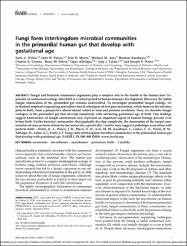Fungi form interkingdom microbial communities in the primordial human gut that develop with gestational age

View/
Access
info:eu-repo/semantics/openAccessDate
2019Author
Willis, Kent A.Purvis, John H.
Myers, Erin D.
Aziz, Michael M.
Karabayır, İbrahim
Gomes, Charles K.
Pierre, Joseph F.
Metadata
Show full item recordAbstract
Fungal and bacterial commensal organisms play a complex role in the health of the human host. Expansion of commensal ecology after birth is a critical period in human immune development. However, the initial fungal colonization of the primordial gut remains undescribed. To investigate primordial fungal ecology, we performed amplicon sequencing and culture based techniques of first-pass meconium, which forms in the intestine prior to birth, from a prospective observational cohort of term and preterm newborns. Here, we describe fungal ecologies in the primordial gut that develop complexity with advancing gestational age at birth. Our findings suggest homeostasis of fungal commensals may represent an important aspect of human biology present even before birth. Unlike bacterial communities that gradually develop complexity, the domination of the fungal communities of some preterm infants by Saccromycetes, specifically Candida, may suggest a pathologic association with preterm birth.


















